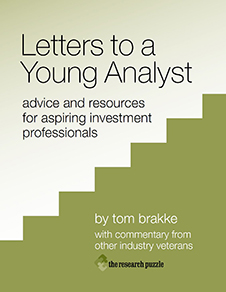
- Saturday, July 21st, 2012
- the enormous radio
-
In the classic John Cheever short story, “The Enormous Radio,” an average couple who “lived on the twelfth floor of an apartment house near Sutton Place” purchased a new radio. Not long after it arrived they began to hear through it not the classical music that they favored, but sounds coming from other apartments in the building. First mechanical noises and then voices.
In no time the inner secrets of their neighbors became known to them. Then the Westcotts realized that there were differences between the lives that they saw in elevators or at parties or at lunch and those that played out behind closed doors.
Their radio was tuned to one apartment at a time. What if you had an “enormous radio” of your own, which allowed you to listen in on the interactions of the players in the financial markets? Who would you want to dial up?
I know I’d want to hear the give and take between the Masters of the Universe and their Muppets, although I fear it would be too much like the Westcotts listening to Mr. Osborn beating his wife in 16-C.
Overhearing sales pitches for investment products and services would be very frustrating, in that I’d be yelling at the radio all of the facts being conveniently left out and the questions that should be asked of the person making the pitch.
What I’d most like to witness? The decision making discussions at investment firms, since that is the subject of much of my consulting and writing. That portfolio manager that’s talking on CNBC now — what did he say to his analysts this morning? And, by the way, is he just a figurehead that’s good on television and someone else is really running the show?
Which firms rely on the Street for their ideas? Which do truly original research? How are decisions made? If you look at the investment process as outlined in the pitch book or product brochure, how closely does it match what you’ve learned by eavesdropping?
Alas, we don’t have such a radio. Instead we must try to figure out what’s going on behind closed doors ourselves. That is the essence of investment analysis and due diligence. A story may sound wonderful, the numbers may look good, and an advocate may inspire trust, but you should never take any of them at face value.
The best personal attributes that you can have are a healthy skepticism and an inquisitive inclination. That will help you pick away at the truth and avoid the version of it that is publicly on display.
